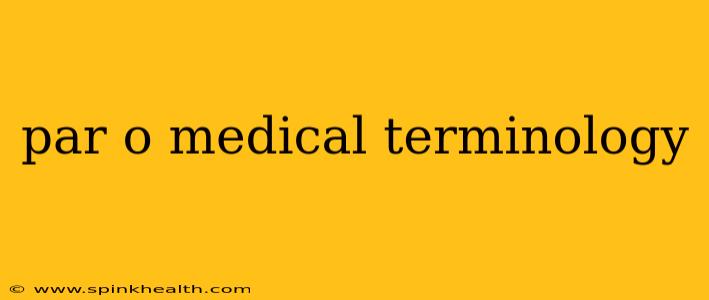Decoding the Mysteries: A Journey into Paramedical Terminology
The world of healthcare is brimming with specialized language, and understanding it can feel like deciphering a secret code. This is especially true for paramedical terminology, a complex system of words and abbreviations used by paramedics, EMTs, and other allied health professionals. But fear not! This journey will unravel the intricacies of paramedical terminology, revealing its secrets and empowering you with a clearer understanding of this vital field.
Imagine this: the shrill wail of a siren cuts through the night. A paramedic team, responding to an emergency, arrives on the scene. Their actions are swift, precise, and guided by a shared understanding of medical terms. They assess the situation, using specific vocabulary to communicate the patient's condition to the hospital. That's the power of paramedical terminology—clear, efficient communication in high-stakes situations.
What exactly is Paramedical Terminology?
Paramedical terminology encompasses the specialized vocabulary used by healthcare professionals who provide emergency and pre-hospital care. It's a blend of medical terms, anatomical references, and procedural descriptions, all tailored to the fast-paced environment of emergency response. Mastering this vocabulary is crucial for accurate documentation, efficient teamwork, and ultimately, providing the best possible care.
What are some common examples of Paramedical Terms?
Let's dive into a few examples to illustrate the everyday language of paramedics:
-
ABCs: This isn't just your childhood alphabet. In paramedical terms, it stands for Airway, Breathing, Circulation, the fundamental assessment priorities for any patient. Getting the ABCs right is critical in stabilizing a patient's condition.
-
BP: Short for Blood Pressure, this vital sign is constantly monitored, giving paramedics insight into a patient's cardiovascular health.
-
GCS: The Glasgow Coma Scale is a neurological assessment tool used to measure a patient's level of consciousness. This numerical score is a key indicator of the severity of head injuries.
-
CPR: Everyone knows Cardiopulmonary Resuscitation—the life-saving technique used to restore breathing and circulation.
-
AED: An Automated External Defibrillator is a portable device that analyzes a patient's heart rhythm and delivers an electric shock if necessary. This crucial tool helps paramedics treat cardiac arrest.
What are some common abbreviations used in paramedical terminology?
Abbreviations are commonplace to save time and enhance communication speed during emergencies. Here are a few common ones:
- TIA: Transient Ischemic Attack (mini-stroke)
- MI: Myocardial Infarction (heart attack)
- CHF: Congestive Heart Failure
- SOB: Shortness of Breath
- CVA: Cerebrovascular Accident (stroke)
How is paramedical terminology used in practice?
Paramedical terminology isn't just for internal communication among professionals. It’s also vital for:
- Precise documentation: Accurate record-keeping ensures continuity of care when transferring a patient to a hospital.
- Clear communication with hospitals: Paramedics use specific terms to inform the hospital team about a patient's condition, improving the efficiency of emergency room procedures.
- Effective teamwork: Clear and concise communication is essential in the high-pressure environment of emergency response. A shared understanding of terms saves precious seconds.
How can I learn more about paramedical terminology?
Several resources are available to learn more about paramedical terminology:
- Medical dictionaries: Look for dictionaries specifically geared towards emergency medical services (EMS).
- Online courses: Various online platforms offer courses in paramedical terminology.
- Textbooks: EMS textbooks often include comprehensive glossaries.
Learning paramedical terminology is a journey of understanding, a pathway into the heart of emergency response. While mastering the language takes time and dedication, the rewards—enhanced knowledge, improved communication, and ultimately, contributing to better patient care—make the effort worthwhile. So, continue exploring this world of vital words, and you'll find your understanding and appreciation of paramedical work deepen with every new term you learn.

